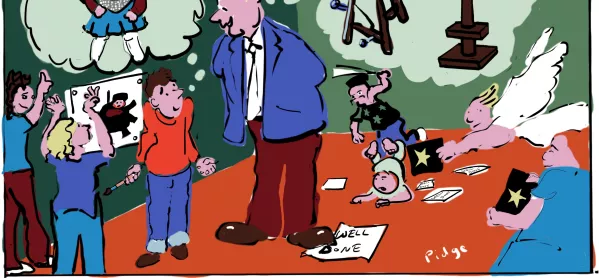We are looking for positives in Freddie’s painting of Henry VIII. It’s based on Hans Holbein the Younger’s portrait of the great English monarch. In the painter’s depiction we see a Tudor sex god, resplendent in robes adorned with gold and precious jewels, standing legs apart in a way that emphasises great strength, power and masculinity. In Freddie’s he looks “like a fat beetle what got stamped on”.
These are Freddie’s words, not mine, and neither Courtney’s observation that his bright red beard makes him look fierce, nor Damon’s suggestion that his dagger looks like you could really stab somebody with it, can convince Freddie that his picture is any good. “Everybody knows it’s crap, so what’s the point in lying?” he asks. It’s a good question.
Freddie’s artistic skills aren’t brilliant but he has other talents. He’s good at mental calculations, he’s even better at pulling faces that make children laugh, and best of all he can spot bullshit a mile off. Knowing he’s not much good with a paintbrush barely dents his self-esteem.
Emphasising positives and minimising negatives is what primary teachers do. Nobody wants to undermine Billy’s confidence at matching fractions. None of us would deliberately thwart Katie’s belief that she can do a forward roll. But sometimes are we in danger of going a reward sticker too far? For example, should fear of lighting Cameron’s blue touch-paper stop us making him rewrite his sentence using finger spaces?
Henry VIII’s tyrannical behaviour should act as a cautionary tale. Like The Emperor’s New Clothes it is a royal reminder of the dangers of praise inflation. Exaggerated compliments that bolster one child’s fragile sense of self-worth will turn another into Genghis Khan. Alternatively, their overuse merely devalues them, as evidenced by the number of dog-eared certificates of achievement that litter my classroom floor at the end of every day.
Anyway, children are more emotionally robust than we think. Like Freddie, they know it’s OK to be crap (or at least not gifted) in some areas, which is why teaching them to accept failure can be just as important as teaching them to strive for success. Because nobody is good at everything it’s crucial to avoid taking their flaws too seriously. My old woodwork teacher firmly believed honesty was the best policy, but he always sweetened bitter pills of truth with a coating of humour.
“What the heck’s this, Eddison?” said Mr Kettle. He ran a critical eye over my hexagonal-based plant pot stand with hand-turned legs. We were both fully aware of its poor construction. Its lack of stability and less than aesthetic appearance were obvious. After a while he said, “That’s not a stand made for a plant pot; that’s a stand made by a plant pot!” And we both laughed like crazy.
As an adult I never blame Mr Kettle for my DIY failures. He never cajoled me into thinking I was an expert with a tenon saw. He didn’t persuade me that I had the capacity to construct a dovetail joint. He merely confirmed what I and Mrs Eddison both know, I don’t have what it takes to be a Chippendale.
Steve Eddison writes a fortnightly column for Tes magazine. He is a teacher at Arbourthorne Community Primary School in Sheffield




